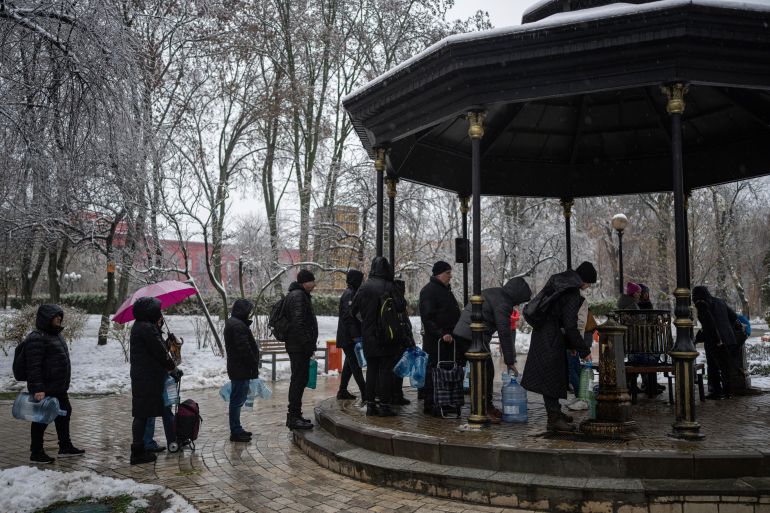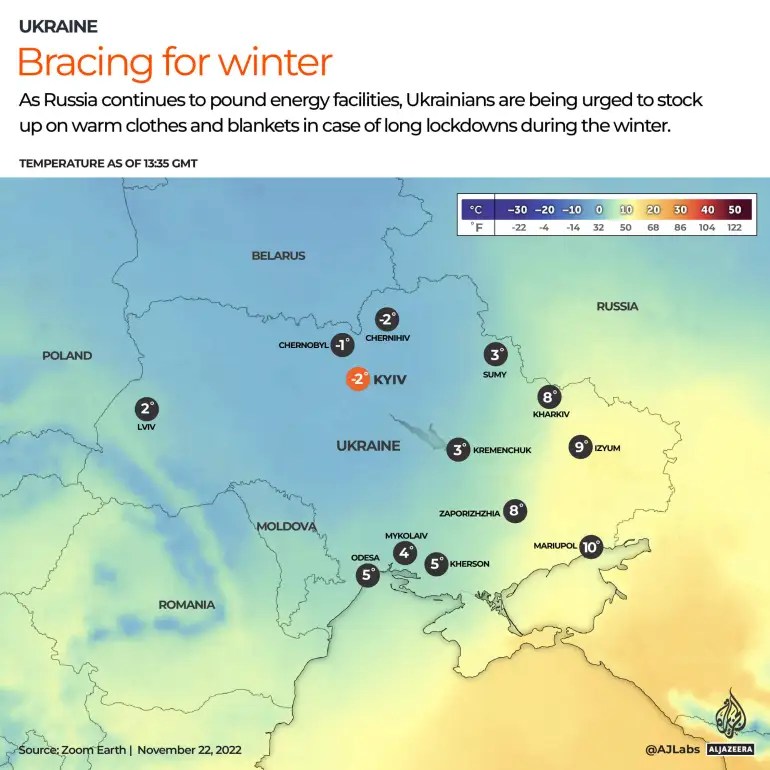Bombed, not beaten: Ukraine’s capital flips to survival mode
Residents collect rainwater from drainpipes and huddle in the few cafes with power after a barrage of deadly Russian air raids.

Residents of Ukraine’s bombed capital clutched empty bottles in search of water and crowded into cafés for power and warmth, switching defiantly into survival mode after new Russian missile strikes on Wednesday plunged the city and much of the country into the dark.
In the city of three million, some residents resorted to collecting rainwater from drainpipes, as repair teams laboured to reconnect supplies.
Keep reading
list of 4 itemsRussia intensifies attacks on Ukraine’s Kharkiv region
‘The goal is not peace’: What’s behind Putin’s wartime Russia reshuffle?
Russia-Ukraine war: List of key events, day 809
Friends and family members exchanged messages to find out who had electricity and water back. Some had one but not the other.
The aerial onslaught on Ukraine’s power grid left many with neither.

Oleksiy Rashchupkin, a 39-year-old investment banker, awoke to find that the water supply had been restored to his third-floor flat but the electricity supply had not. His freezer thawed in the blackout, leaving a puddle on his floor.
So he hopped into a cab and crossed the Dnieper River from the left bank to right, to a café that he had noticed had stayed open after previous Russian strikes – sure enough, it was serving hot drinks and food, and the music and WiFi were on.
“I’m here because there is heating, coffee and light,” he said. “Here is life.”
Kyiv Mayor Vitali Klitschko said about 70 percent of the Ukrainian capital was still without power on Thursday morning.
As Kyiv and other cities picked themselves up, Kherson on Thursday came under its heaviest bombardment since Ukrainian forces recaptured the southern city two weeks ago. The barrage of missiles killed four people outside a coffee shop and a woman was also killed next to her house, witnesses said, speaking to The Associated Press news agency.
In Kyiv, where cold rain fell on the remnants of previous snowfalls, the mood was grim but steely. The winter promises to be a long one. But Ukrainians say that if Russian President Vladimir Putin’s intention is to break them, he should think again.
“Nobody will compromise their will and principles just for electricity,” said Alina Dubeiko, 34. She, too, sought out the comfort of another, equally crowded, warm and lit café. Without electricity, heating and water at home, she was determined to keep up her work routine. Adapting to a life shorn of its usual comforts, Dubeiko said she uses two glasses of water to wash, then catches her hair in a ponytail and is ready for her working day.
She said she would rather be without power than live with the Russian invasion, now in a tenth month.
“Without light or you? Without you,” she said, echoing remarks President Volodymyr Zelenskyy made when Russia on October 10 unleashed the first of what has now become a series of aerial attacks on key Ukrainian infrastructure.

Western leaders denounced the bombing campaign. “Strikes against civilian infrastructures are war crimes,” French President Emmanuel Macron tweeted.
Russian Defence Ministry spokesman Igor Konashenkov acknowledged on Thursday that it targeted Ukrainian energy facilities. But he said they were linked to Ukraine’s military command and control system and that the aim was to disrupt the flows of Ukrainian troops, weapons and ammunition to the front lines. Authorities for Kyiv and the wider Kyiv region reported a total of seven people killed and dozens wounded.
Russian UN Ambassador Vassily Nebenzia said: “We are conducting strikes against infrastructure in response to the unbridled flow of weapons to Ukraine and the reckless appeals of Kyiv to defeat Russia.”
Kremlin spokesman Dmitry Peskov also sought to shift blame for civilian hardship on Ukraine’s government.
“Ukraine’s leadership has every opportunity to bring the situation back to normal, has every opportunity to resolve the situation in such a way as to meet the demands of the Russian side and, accordingly, end all possible suffering of the civilian population,” Peskov said.
 In Kyiv, people lined up at public water points to fill plastic bottles.
In Kyiv, people lined up at public water points to fill plastic bottles.
In a strange new wartime first for her, 31-year-old health department employee Kateryna Luchkina resorted to collecting rainwater from a drainpipe, so she could at least wash her hands at work, which had no water.
She filled two plastic bottles, waiting patiently in the rain until they had water to the brim. A colleague followed behind her, doing the same.
“We Ukrainians are so resourceful, we will think of something. We do not lose our spirit,” Luchkina said. “We work, live in the rhythm of survival or something, as much as possible. We do not lose hope that everything will be fine.”
The city mayor said on Telegram that power engineers “are doing their best” to restore electricity. Water repair teams were making progress, too. In the early afternoon, Klitschko announced that water supplies had been restored across the capital, with the caveat that “some consumers may still experience low water pressure”.
Electricity and water were gradually coming back elsewhere, too. In Ukraine’s southeastern Dnipropetrovsk region, the governor announced that 3,000 miners trapped underground because of power blackouts had been rescued. Regional authorities posted messages on social media updating people on the progress of repairs but also saying they needed time.
Mindful of the hardships — both now and ahead, as winter progresses — authorities are opening thousands of so-called “points of invincibility” — heated and powered spaces offering hot meals, electricity and internet connections. More than 3,700 were open across the country as of Thursday morning, said a senior official in the presidential office, Kyrylo Tymoshenko.
In Kherson, hospitals without power and water are also contending with the gruesome after-effects of intensifying Russian strikes. They hit residential and commercial buildings on Thursday, setting some ablaze, blowing ash skyward and shattering glass across streets. Paramedics helped the injured.
Olena Zhura was carrying bread to her neighbours when a strike that destroyed half of her house wounded her husband, Victor. He writhed in pain as paramedics carried him away.
“I was shocked,” she said, welling with tears. “Then I heard [him] shouting: ‘Save me, save me.’”